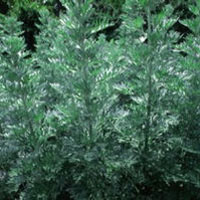Wormwood
 © Steven Foster
© Steven FosterHow It Works
The aromatic oil of wormwood contains the toxins thujone and isothujone. Very little of this oil is present in ordinary wormwood teas or tinctures.3 Also existent in the plant are strong bitter agents known as absinthin and anabsinthin. These stimulate digestive and gallbladder function.4 Modern herbal medicine rarely uses wormwood alone. It is typically combined with herbs such as peppermint or caraway to treat heartburn and even irritable bowel syndrome. Clinical trials are lacking to support the use of wormwood for any indication, however.
How to Use It
A wormwood tea can be made by adding 1/2 to 1 teaspoon (2.5 to 5 grams) of the herb to 1 cup (250 ml) of boiling water, then steeping for ten to fifteen minutes.5 Many doctors recommend drinking three cups (750 ml) each day. Tincture, 10–20 drops in water, can be taken ten to fifteen minutes before each meal.6 Either preparation should not be used consecutively for more than four weeks.7
Copyright © 2025 TraceGains, Inc. All rights reserved.
Learn more about TraceGains, the company.
The information presented by TraceGains is for informational purposes only. It is based on scientific studies (human, animal, or in vitro), clinical experience, or traditional usage as cited in each article. The results reported may not necessarily occur in all individuals. Self-treatment is not recommended for life-threatening conditions that require medical treatment under a doctor's care. For many of the conditions discussed, treatment with prescription or over the counter medication is also available. Consult your doctor, practitioner, and/or pharmacist for any health problem and before using any supplements or before making any changes in prescribed medications. Information expires December 2025.










